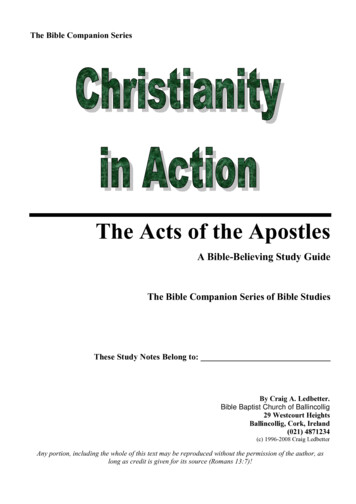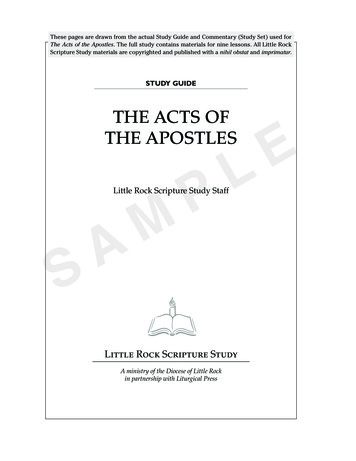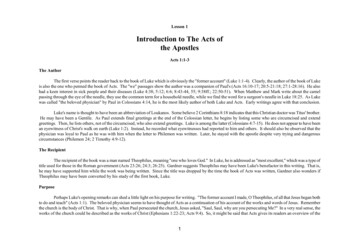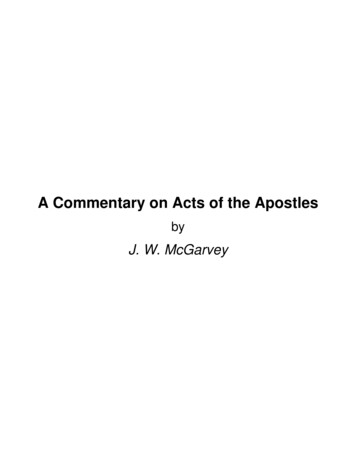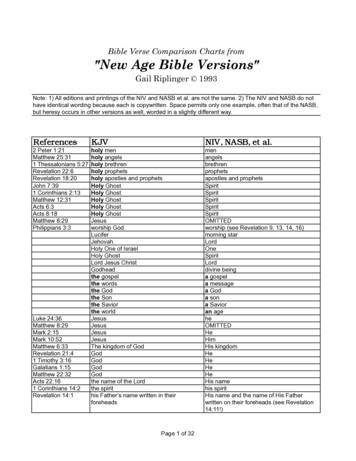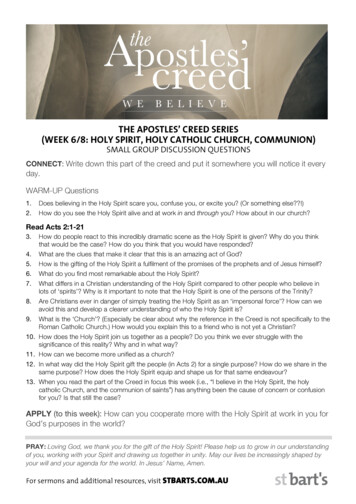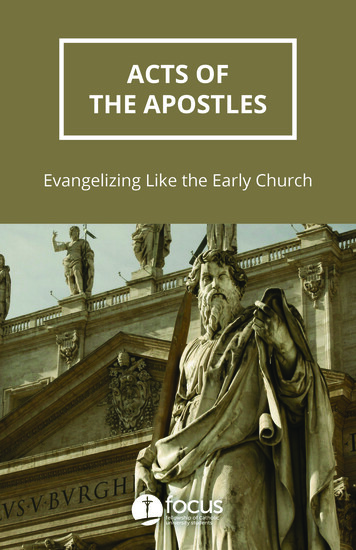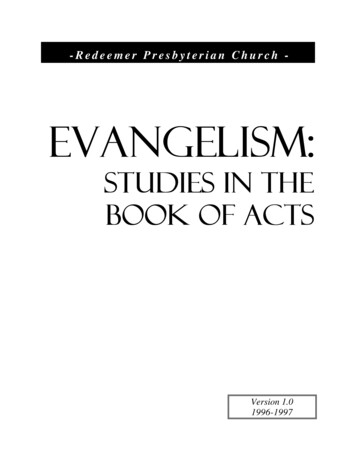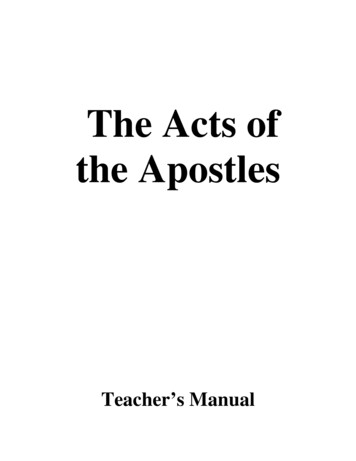
Transcription
The Acts ofthe ApostlesTeacher’s Manual
The Acts of the ApostlesContentsLesson 1 – Introduction to the Book 3-9Lesson 2-3 – The Keys of the Kingdom 10-20Lesson 4-6 – Acts Chapter 1 .21-41Lesson 7-8 – Acts Chapter 2 .42-58Lesson 9-10 – Acts Chapter 3-4 59-76Lesson 11 – Acts Chapter 5 .77-83Lesson 12 – Acts Chapter 6-7 .84-91Lesson 13 – Acts Chapter 8 .92-97Lesson 14 – Acts Chapter 9 .98-106Lesson 15 – Acts Chapter 10-11 107-115Lesson 16 – Acts Chapter 12 .116-123Lesson 17 – Acts Chapter 13 .124-132Lesson 18 – Acts Chapter 14 .133-138Lesson 19 – Acts Chapter 15 .139-146Lesson 20 – Acts Chapter 16-17 .147-157Lesson 21 – Acts Chapter 18-19 .158-167Lesson 22 – Acts Chapter 20-22 .168-176Lesson 23 – Acts Chapter 23-26 .177-184Lesson 24 – Acts Chapter 27-28 .185-194The Book of Acts Bill ScheidlerTeacher’s Manual2
Lesson 1Introduction to the BookI.Why should we study the Book of Acts?A. The Book of Acts is a bridge connecting the Gospels and the Epistles.1. It is the outcome of the Gospels.a. In the Gospels, Jesus is seen as a grain of wheat who falls to the ground anddies (John 12:24).Most assuredly, I say to you, unless a grain of wheat falls into the groundand dies, it remains alone; but if it dies, it produces much grain.b. The book of Acts gives us the result of Jesus’ willingness to lay down Hislife. It is the “much fruit” that is brought forth.2. It is a sequel to the Gospels.a. In the Gospels, Christ purchases the Church with His blood. In the Book ofActs, that Church rises to actual existence.b. In the Gospels, Jesus gives His famous prophecy stating, “I will build mychurch” (Mt. 16:18). In the Book of Acts, we see the fulfillment of thatprophecy.c. In the Gospels, Christ issued the commands to His followers to take thegospel to the ends of the earth. In the Book of Acts, we get a glimpse of justhow the apostles responded to those commands under the guidance anddirection of the Holy Spirit.3. It is an introduction to the Epistlesa. It gives the background and occasion for much of what will follow.b. It helps us to understand the Epistles in their historical context.B. The Book of Acts is the only book in the New Testament that focuses onpractical theology.1. It establishes for us the foundational truths and principles of the Church “in wordand deed.”2. It demonstrates for us in living form all of the teaching of Christ in the Gospels.3. It illustrates the life application of all the doctrine outlined in the Epistles.4. It provides a textbook on such things as:The Book of Acts Bill ScheidlerTeacher’s Manual3
a.b.c.d.e.f.g.h.i.EvangelismMinistry in the spiritMissionsChurch plantingChurch governmentTeam ministryPrayer life of the churchCharacter of a biblical ChristianThe training and releasing of leadersC. The Book of Acts is a book of inspiration in these days of the restoration of theChurch.1. It provides a record of the early rain outpouring of the Spirit.2. It gives us a description of much that God is restoring.3. It provides us a glimpse of and stirs our faith in regard to what God wants to doin the Church today.D. The Book of Acts is the only unfinished book in the Bible.1. It is one book that has no “amen” to it.2. It closes with the continued preaching of the Kingdom of God (Acts 28:30-31).Then Paul dwelt two whole years in his own rented house, and received allwho came to him, preaching the kingdom of God and teaching the thingswhich concern the Lord Jesus Christ with all confidence, no one forbiddinghim.3. Our lives are to help complete this book throughout the ages.II.What is the significance of the title of this book?A. This book is titled “The Acts of the Apostles,” or more literally “Acts of Apostles.”Although many would suggest other titles, this one has merit because:1. It is the story of how God uses weak human vessels to implement His eternalpurposes.2. It shows us what can be accomplished as we stand “in Christ?” I can do allthings . . . .3. One of the key words in the Book of Acts is “apostle” or “apostles.”a. Apostolos (apostle) is used 30 timesThe Book of Acts Bill ScheidlerTeacher’s Manual4
b. Apostello (sent) is used 25 times.c. Apostolee (apostleship) is used once.B. Some have suggested other titles.1. Some have suggested in jest, “Some of the Acts of Some of the Apostles.”a. It neither contains all of the acts of some of the apostles,b. Nor some of the acts of all of the apostles.c. It focuses on two apostles. In the first twelve chapters, Peter is the centralfigure. In the rest of the Book of Acts, the central figure is Paul.2. Others feel it could more appropriately be called “The Acts of the Holy Spirit inthe Church.”a. Nearly every chapter contains reference to the Holy Spirit.b. There are 50 (Pentecost) references to the Holy Spirit in the Book of Acts.3. It could be called the “Life of Paul.”Even though Peter is a central figure in the early chapters, as soon as Paul isintroduced the focus of the book changes. It could be argued that even thematerial surrounding the ministry of Peter only provides an introduction to Pauland his ministry to the Gentiles. The events that are recorded prior to Paul’sapostolic work all have a bearing on such a ministry.4. Other suggestions include:a. Actsb. The Acts of the Holy Spiritc. The Gospel of the Holy Spiritd. The Gospel of the Resurrectione. The Acts of the Ascended and Glorified Lordf. Luke-Actsg. The Book of the Continual Doing and Teaching of the Living Christ by theHoly Spirit through His Body Which Is the Church (G. Campbell Morgan)III.Who wrote the book of Acts?A. The real author is the Holy Spirit (II Pet. 1:21; II Tim. 3:14-17).B. The human author was a man by the name of “Luke.”The Book of Acts Bill ScheidlerTeacher’s Manual5
1. Luke was referred to by Paul as the “beloved physician” and is the only Gentileauthor in the New Testament (Col. 4:14)2. Luke also wrote the gospel that bears his name, which is an account of Christ’searthly ministry – “Christ according to the flesh.”3. Luke wrote Acts as a continuation recording Christ’s heavenly ministry – “Christaccording to the spirit.”4. Because of the way the Book of Acts ends, many have suggested that he wasplanning on writing another book to finish the story.5. There is much evidence to establish Luke as the author.a. Both Acts and Luke are addressed to the same person—Theophilos (Acts1:1; Luke 1:3).b. The writer refers to a former treatise—the Gospel of Luke (Acts 1:1).c. The style of both the Gospel and the Book of Acts are the same (medicallanguage).Fifty words are used in common to the two books that are not foundanywhere else in the New Testament.d. Luke was a companion of Paul and, therefore, qualified to write the book(Acts 16:10, 20:4-6, 28:16; Col. 4:14; II Tim. 4:11; Phil. 4).Notice the use of the pronoun “we” (Acts 16:19, 20:4-5).e. Luke’s authorship of both books is unanimously attested to by Early Churchtradition.IV.When was the Book of Acts written?A. The Book of Acts was most likely written between 63 and 65 A.D.1. Paul was still in prison in Rome and had not come to trial.2. The reign of Nero included these years.3. It was obviously written before the death of Paul.4. It was very likely written shortly after the close of the time covered in the book,after Paul had been two years in Rome.B. The Book of Acts covers approximately 33 years from the ascension of Jesus to thetime when Paul had been in prison in Rome for two years (See Chart on theChronology of the Book of Acts).The Book of Acts Bill ScheidlerTeacher’s Manual6
V.What is a general overview of the contents of the Book of Acts?A. This is the first history of the church and the only unfinished book in the Bible.1. It is simply a sketch history (John 21:25).2. The history of the Church continues to be recorded in the book of heaven.3. We can expect the end to be greater than the beginning (Eccl 7:8).B. The book, like Genesis, is the book of beginnings and it is just as important. Itcontains the following beginnings:1. The Holy Spirit’s work of evangelism2. The gospel of preaching (I Cor 15:1-4)3. A new dispensation (the Holy Spirit)4. The Church of our Lord5. World-wide evangelism6. Salvation through the blood of ChristC. The book centers on the work of two great apostles.1. Peter to the Jews (Chapters 1-12)2. Paul to the Gentiles (Chapters 13-28)D. The book revolves around four geographical centers.1. Jerusalem - home missions2. Antioch - foreign missions3. Ephesus4. Rome5. Thus, the gospel begins in Jerusalem, the religious hub of the world, and ends inRome, the political hub of the world.E. The book gives to us a glimpse into the divine execution of the Great Commission(Mt. 28:18-20; Mark 16:15-20; Luke 24:46-47).The Book of Acts Bill ScheidlerTeacher’s Manual7
VI.What is the key verse and how is it fulfilled in the Book of Acts?The key verse in the Book of Acts is Acts 1:8. It is the key verse because it gives theorder of witness in the Book of Acts.But you shall receive power when the Holy Spirit has come upon you; and you shallbe witnesses to Me in Jerusalem, and in all Judea and Samaria, and to the end of theearth.”A. Jerusalem (Acts 1:4, 8; Luke 24:47)B. Judea (Acts 2:9, 14, 8:1, 9:31, 10:37, 11:1, 19, 15:1)Now Saul was consenting to his death. At that time a great persecution aroseagainst the church which was at Jerusalem; and they were all scatteredthroughout the regions of Judea and Samaria, except the apostles. Acts 8:1C. Samaria (Acts 8-10)Therefore those who were scattered went everywhere preaching the word. ThenPhilip went down to the city of Samaria and preached Christ to them. Acts 8:4-5D. Uttermost parts of the earth (Acts 11:19, 23:11, 28:14-31).Now those who were scattered after the persecution that arose over Stephentraveled as far as Phoenicia, Cyprus, and Antioch, preaching the word to no onebut the Jews only. But some of them were men from Cyprus and Cyrene, who,when they had come to Antioch, spoke to the Hellenists, preaching the Lord Jesus.And the hand of the Lord was with them, and a great number believed and turnedto the Lord. Acts 11:19-21But the following night the Lord stood by him and said, “Be of good cheer, Paul;for as you have testified for Me in Jerusalem, so you must also bear witness atRome.” Acts 23:11VII.What was the purpose for which this book was written?There are many possible reasons that have been suggested for which Luke may havewritten this book.He may have written it A. To preserve an historical record of the origins of the Early Church. Luke, being aman of education, would be concerned that these happenings were recorded forfuture generations.B. To demonstrate the continuing work of Christ through the ministry of the Holy Spirit(Acts 1:1).The Book of Acts Bill ScheidlerTeacher’s Manual8
C. To defend the church from the Roman Empire’s antagonism toward the Jews byshowing that while they share common scriptures, they are a separate religious groupthat the Romans need not fear.D. To demonstrate the pattern by which Christ builds His church.E. To provide a defense of Christianity in a time when world-wide persecution wasforeseen. From this book could be demonstrated the past Roman policy of ignoringbut never persecuting the early Christian leaders.F. To assist in the evangelization of the Jews by showing that Christianity is indeed thefulfillment of the Old Testament.G. To provide a biographical sketch of the life of one of the greatest apostles in the earlychurch.H. To provide a defense brief to be presented at Paul’s trial to explain his arrest and thecharges that were against him.VIII. What are the key words used in the Book of Acts?Key words often give insight into the main message of a book. Some of the key wordsin the Book of Acts include the following: IX.Paul – 154Peter – 64(Holy) Spirit – 50Word (of God) – 48Name (of Jesus, the Lord) – 34Apostle(s) – 30Witness (or some form of the word) – 30Prayer – 28What is the key message of the Book of Acts?Note to Teacher: Have the class make a sentence with all the key words in it.Sample: The story of how God equips people with supernatural equipment (Holy Spirit,Name of Jesus, Word of God, Prayer) and sends (apostello) them out to be His witnessesand accomplish His purpose.The Book of Acts Bill ScheidlerTeacher’s Manual9
The Book of Acts Bill ScheidlerTeacher’s Manual10
Lesson 2-3The Keys of the Kingdom in the Book of ActsI.What is the purpose of a key?A. A key is an instrument used to lock or unlock something.B. A key is anything that is used to disclose, open, unlock or solve something.C. Symbolically, keys speak of authority, power and right.II.What is Jesus’ relationship to keys?A. Jesus has all power and authority (Mt. 28:18).B. Jesus has control over many keys.1. He holds the keys of the kingdom of heaven (Mt. 16:19).And I will give you the keys of the kingdom of heaven, and whatever you bindon earth will be bound in heaven, and whatever you loose on earth will beloosed in heaven.2. He has the keys of hell and death (Rev. 1:18).I am He who lives, and was dead, and behold, I am alive forevermore. Amen.And I have the keys of Hades and of Death.3. He has the key of David (Is. 22:22; Rev. 3:7).The key of the house of David I will lay on his shoulder; so he shall open, andno one shall shut; and he shall shut, and no one shall open. Isaiah 22:224. He has the key to the bottomless pit (Rev. 9:1; 20:1).C. Jesus said that He would give His followers the keys of the kingdom of heaven(Mt. 16:18-19).And I also say to you that you are Peter, and on this rock I will build My church,and the gates of Hades shall not prevail against it. And I will give you the keys ofthe kingdom of heaven, and whatever you bind on earth will be bound in heaven,and whatever you loose on earth will be loosed in heaven.III.What are the keys of the kingdom that functioned in the Book of Acts?What are the keys that unlock the Book of Acts? What are the keys to the success ofthe disciples in the Book of Acts? What were the keys that opened the doors to theGospel in the Book of Acts? What were the tools in the hands of the disciples thatThe Book of Acts Bill ScheidlerTeacher’s Manual11
made it possible for them to carry out the Great Commission?A. Key Number One: The Holy Spirit1. The Church cannot function or even attempt to fulfill the Great Commissionwithout a relationship to and a reliance on the Holy Spirit.2. The apostles in the Book of Acts lived in the conscious awareness of beingmotivated by, empowered by, and under the authority of the Holy Spirit.3. The work and ministry of the Holy Spirit is central to the Book of Acts, beingmentioned some 50 times.a. The Holy Spirit in the Book of Acts had a nine-fold role. The Holy Spiritwas: The Commander-in-Chief (1:2)The Inspirer of Prophecy (1:16; 11:28; 13:2, 4)The Fulfillment of Prophecy (2:17-18)The Promise of the Father (2:33)The Gift of God (2:28, 15:8)The Comforter of the Churches (9:31)The Confirmer of the Word (10:38, 44-47)The Rain from Heaven (2:11-18; 10:38, 44-47)The Bringer of Joy (13:52)b. The disciples in the Book of Acts had a ten-fold relationship to the HolySpirit. They were: Empowered by the Spirit (1:8)Baptized in the Spirit (1:5)Recipients of the Spirit (8:15; 19:2-6)Filled with the Spirit (Acts 2:4; 4:8; 6:3, 5)Co-witnesses with the Spirit (5:32)Prompted by the Spirit (18:5)Appointed by the Spirit (20:23, 28)Separated and sent by the Spirit (13:2, 4)Transported by the Spirit (8:39)Led, guided and directed by the Spirit (8:29)Philip was directed by the Spirit to join himself to the Ethiopian man in thechariot (Acts 8:29). The Holy Spirit orchestrated the meeting between Peterand Cornelius that opened the door of faith to the Gentiles (Acts 10:19). Theconclusions of the council at Jerusalem were inspired by the Holy Spirit(Acts 15:28). Paul was led by the Holy Spirit to go to Macedonia and open awhole new region to the Gospel (Acts 16:6-7). Agabus was inspired by theHoly Spirit to warn Paul concerning his arrest in Jerusalem (Acts 21:11).The Book of Acts Bill ScheidlerTeacher’s Manual12
What would have happened in these instances if these individuals had notbeen open and responsive to the voice of the Holy Spirit in their lives?4. All through the Book of Acts we find that the Holy Spirit is the dynamic in theministry of the apostles, and to be filled with the Spirit is absolutely essential foreffective and acceptable service.5. “In the Book of Acts there is a strong and vivid realization of His presence, amanifest and victorious sense of His working, which is sadly lacking in theexperience of the Church today.” Wilbur Smith6. Every worker for God must be filled with the Holy Spirit. No lower standard iseither accepted or suggested. Even for the work of serving tables, this wasregarded as an indispensable necessity.B. Key Number Two: PrayerPrayer is the pipeline of the Holy Spirit. Prayer is the link that connects the saintswith the Lord of heaven. Prayer is the channel of the supply of the Spirit. It is theway in which we access our heavenly instructions. The Apostles in the Book of Actsdemonstrated an absolute dependence on God which is evidenced by their continualwatchfulness in prayer.At least 17 out of the 28 chapters in the Book of Acts have a reference to prayer.Someone has once said that you can measure your dependence on God by theamount of time that you spend in prayer.1. They “continued steadfastly” in prayer (Acts 2:42).And they continued steadfastly in the apostles’ doctrine and fellowship, in thebreaking of bread, and in prayers.a. To continue steadfastly is “to persevere; to give constant attention to a thing;to adhere to one; be devoted to; not to faint; to show oneself courageous; tobe in constant readiness for; to wait on continually.”b. Other translations state They.devoted themselves to. --NLTAnd they steadfastly persevered, devoting themselves constantly to --Amp2. They “gave themselves” to prayer (Acts 6:4). but we will give ourselves continually to prayer and to the ministry of theword.The Book of Acts Bill ScheidlerTeacher’s Manual13
This word means “to be earnest toward, to persevere in and to be constantlydiligent in prayer.”3. They prayed on a regular basis (Acts 3:1; 10:2, 4; 12:5; 16:13).Now Peter and John went up together to the temple at the hour of prayer, theninth hour. Acts 3:1When you maintain your hour of prayer, you never know when God is goingto meet you in a special way. On this day Peter and John would see themiracle working power of God displayed as they went up to pray.There was a certain man in Caesarea called Cornelius, a centurion of whatwas called the Italian Regiment, a devout man and one who feared God withall his household, who gave alms generously to the people, and prayed to Godalways. About the ninth hour of the day he saw clearly in a vision an angel ofGod coming in and saying to him, “Cornelius!” Acts 10:1-3When you “pray always” there are those times when you get new visions andrevelation from the Lord.Peter was therefore kept in prison, but constant prayer was offered to God forhim by the church. Acts 12:5When you maintain “constant prayer” for something you will see chains falloff, prison doors opened and the captive set free.And on the Sabbath day we went out of the city to the riverside, where prayerwas customarily made; and we sat down and spoke to the women who metthere. Now a certain woman named Lydia heard us. She was a seller ofpurple from the city of Thyatira, who worshiped God. The Lord opened herheart to heed the things spoken by Paul. Acts 16:14When you maintain a custom of prayer you will have divine appointments thatwill open doors for you that you could never plan for yourself. This meetingwith Lydia would be one of the things that opened the door for Paul’s work inPhilippi.4. They prayed in specific situations.a.b.c.d.e.In selecting leadership (Acts 1:24)In setting in leaders (Acts 6:6)In sending out ministries (Acts 13:3)In ordaining elders (Acts 14:23)In departing from friends (Acts 20:26; 21:15)5. They prayed for special requests and needs.a. For boldness (Acts 4:31)b. To receive the Holy Spirit (Acts 8:15)The Book of Acts Bill ScheidlerTeacher’s Manual14
c.d.e.f.g.To raise the dead (Acts 9:40)Peter’s release (Acts 12:12)The mind of the Lord (Acts 16:16)Deliverance (Acts 16:25)Healing (Acts 28:8)The Church in the New Testament was born in prayer. From then on, prayer was avital key to their success. The Christians in the Book of Acts breathed theatmosphere of prayer, believed in the power of prayer, began, continued, and endedall their work with prayer. A prayer-less church is a powerless church.C. Key Number Three: The Word of GodThe Word of God is seen as the Sword of the Spirit in the Book of Acts. TheApostles in the Book of Acts looked solely to the Word of God to impart faith andlife to their hearers.1. The Word of God was central to all of their teaching and preaching. Everymessage is totally saturated with the word of God. All of the sermons aresaturated with Old Testament references and allusions.a. Peter quoted Joel and David in his message on the Day of Pentecost (Acts2:16, 25).b. The apostles went everywhere, preaching the word (Acts 8:4).c. They preached the word to the Jews and quoted the references (Acts 2:16,25).d. They preached the word to the Gentiles and stated the content (Acts 17:2234).2. The Word of God as seen in the Book of Acts was a complete word. It was:a.b.c.d.e.The Word of exhortation (Acts 13:15)The Word of salvation (Acts 13:26)The Word of the Lord (Acts 13:48-49; 16:32)The Word of the gospel (Acts 15:7)The Word of His grace (Acts 14:3; 20:32)So now, brethren, I commend you to God and to the word of His grace,which is able to build you up and give you an inheritance among all thosewho are sanctified. Acts 20:323. The Word of God evoked many positive responses from people.a. They heard the Word (Acts 4:4).The Book of Acts Bill ScheidlerTeacher’s Manual15
b. They received the Word (Acts 2:41; 8:14, 11:1), not just the preacher of theWord.c. They believed the Word (Acts 4:29).d. They desired to hear the Word (Acts 13:7, 42, 44), not just stories.e. They received the Word with readiness of mind (Acts 17:11).f. They gave themselves to the Word (Acts 6:4) and continued steadfastly inthe Word (Acts 2:42).g. They searched the Word (Acts 17:11).These were more fair-minded than those in Thessalonica, in that theyreceived the word with all readiness, and searched the Scriptures daily tofind out whether these things were so. Therefore many of them believed,and also not a few of the Greeks, prominent women as well as men.Acts 17:11-12h. They glorified the Word (Acts 13:48).Now when the Gentiles heard this, they were glad and glorified the wordof the Lord. And as many as had been appointed to eternal life believed.And the word of the Lord was being spread throughout all the region.Acts 13:48-494. The Word of God was used in many ways by the apostles in the Book of Acts.a. They spoke it boldly (Acts 4:29, 37).You can only speak boldly when it is God’s Word. The boldness itself givestestimony to the Word (Acts 14:3).b. They preached the Word everywhere (Acts 8:4, 11:19, 13:5, 14:25, 15:3536).c. They taught the Word (Acts 15:35, 18:11).d. They testified the Word (Acts 8:25).e. They spread or published the Word (Acts 13:49).f. They used the Word to determine policy (Acts 15:15).g. They commended people to the Word (Acts 20:32).5. The Word of God brought forth powerful results.a. The Word moved in power (Acts 10:44). This is what happens when theWord and Spirit are working together.While Peter was still speaking these words, the Holy Spirit fell upon allthose who heard the word.The Book of Acts Bill ScheidlerTeacher’s Manual16
b. All in the area heard the Word (Acts 19:10).And this continued for two years, so that all who dwelt in Asia heard theword of the Lord Jesus, both Jews and Greeks.c. The Word of God increased (Acts 6:7, KJV).And the word of God increased; and the number of the disciples multipliedin Jerusalem greatly; and a great company of the priests were obedient tothe faith.d. The Word of God grew and multiplied (Acts 12:24).But the word of God grew and multiplied.e. The Word of God grew mightily and prevailed (Acts 19:20).So the word of the Lord grew mightily and prevailed.The word that is translated “prevailed” in this verse means “to have force.”The Word of God is a force to contend with and ultimately, if it is upheldabove the words of man, it will overcome or prevail.D. Key Number Four: The Name of the LordWhen Jesus left the earth He extended His authority to His followers (Mt. 28:18-20).He gave them the right to use His name (Mark 16:17-18; John 16:23-24).And in that day you will ask Me nothing. Most assuredly, I say to you, whateveryou ask the Father in My name He will give you. Until now you have askednothing in My name. Ask, and you will receive, that your joy may be full.John 16:23-24The day that Jesus’ spoke of had now arrived. The Apostles in the Book of Actswere totally dependent on the name of the Lord to effect results and empower theirministry.1. The apostles understood that their own resources were limited.a. Their money would never accomplish the task (Acts 3:6).So he gave them his attention, expecting to receive something from them.Then Peter said, “Silver and gold I do not have, but what I do have I giveyou: In the name of Jesus Christ of Nazareth, rise up and walk.” And hetook him by the right hand and lifted him up, and immediately his feet andankle bones received strength. Acts 3:5-7b. Their holiness would never be sufficient (Acts 3:12).The Book of Acts Bill ScheidlerTeacher’s Manual17
So when Peter saw it, he responded to the people: “Men of Israel, why doyou marvel at this? Or why look so intently at us, as though by our ownpower or godliness we had made this man walk?”c. Their own natural abilities would only fall short (Acts 3:16; 4:7-12).And His name, through faith in His name, has made this man strong,whom you see and know. Yes, the faith which comes through Him hasgiven him this perfect soundness in the presence of you all. Acts 3:16And when they had set them in the midst, they asked, “By what power orby what name have you done this?” 8 Then Peter, filled with the HolySpirit, said to them, "Rulers of the people and elders of Israel: 9 If we thisday are judged for a good deed done to a helpless man, by what means hehas been made well, 10 let it be known to you all, and to all the people ofIsrael, that by the name of Jesus Christ of Nazareth, whom you crucified,whom God raised from the dead, by Him this man stands here before youwhole. 11 This is the ‘stone which was rejected by you builders, which hasbecome the chief cornerstone.’ 12 Nor is there salvation in any other, forthere is no other name under heaven given among men by which we mustbe saved.” Acts 4:7-122. The apostles understood that the name of the Lord was God’s special gift tothem.a. As the rod was a special gift to Moses (Ex. 4:1-4, 17).And you shall take this rod in your hand, with which you shall do thesigns. Exodus 4:17b. As the mantle was a special gift to Elijah and Elisha (II Kgs. 2:8, 13-14).3. The apostles understood that His name was equal to His person and representedHis authority (Acts 4:7).And when they had set them in the midst, they asked, “By what power or bywhat name have you done this?”And they set the men in their midst and repeatedly demanded, By what sort ofpower or by what kind of authority did [such people as] you do this [healing]?–Amp4. The apostles in the Book of Acts saw the name of the Lord bringing:a.b.c.d.e.Salvation (Acts 2:21, 4:12)Deliverance (16:18)Healing (Acts 3:6, 4:10)Signs and Wonders (Acts 4:30)Forgiveness and remission of sins (Acts 10:43)The Book of Acts Bill ScheidlerTeacher’s Manual18
5. The Apostles in the Book of Acts related to the name by:a.b.c.d.e.f.g.h.i.j.Having faith in His name (Acts 3:16)Calling on the name (Acts 2:21; 9:14; 22:16)Baptizing in the name (Acts 2:38; 8:16; 10:48; 19:5)Teaching and preaching in the name (Acts 9:21, 27, 29)Teaching and preaching the name (Acts 4:17; 8;12)Magnifying the name (Acts 19:17)Taking out a people for His name (Acts 15:14)Bearing His name (Acts 9:15; 15:17)Doing signs and wonders in His name (Acts 4:30)Suffering for His name (Acts 5:41; 9:16)So they departed from the presence of the council, rejoicing that they werecounted worthy to suffer shame for His name. And daily in the temple, andin every house, they did not cease teaching and preaching Jesus as theChrist. Acts 5:41-42k. Risking their lives for His name (Acts 15:26)l. Being willing to die for His name (Acts 21:13)Then Paul answered, “What do you mean by weeping and breaking myheart? For I am ready not only to be bound, but also to die at Jerusalemfor the name of the Lord Jesus.”They truly did whatever they did in the name of the Lord (Col 3:17).And whatever you do in word or deed, do all in the name of the Lord Jesus,giving thanks to God the Father through Him.6. The Apostles in the Book of Acts faced challenges relative to the name.a. They faced pressure from other religious leaders not to use the name (Acts4:17; 5:28, 40).But when they had commanded them to go aside out of the council, theyconferred among themselves, 16 saying, “What shall we do to these men?For, indeed, that a notable miracle has been done through them is evidentto all who dwell in Jerusalem, and we cannot deny it. 17 But so that itspreads no further among the people, let us severely threaten them, thatfrom now on they speak to no man in this name.” 18 So they called themand commanded them not to speak at all nor teach in the name of Jesus. 19But Peter and John answered and said to them, “Whether it is right in thesight of God to listen to
1. Some have suggested in jest, “Some of the Acts of Some of the Apostles.” a. It neither contains all of the acts of some of the apostles, b. Nor some of the acts of all of the apostles. c. It focuses on two apostles. In the first twelve chapters, Peter is the central figure. In the rest of the Book
